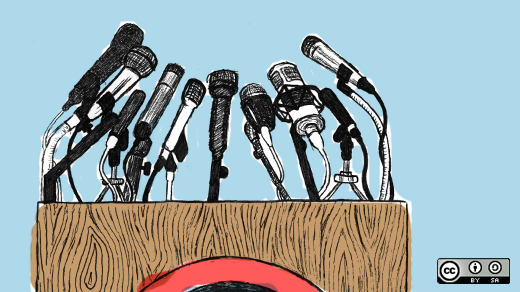I participated in the first-ever Twitter @townhall meeting hosted by the White House on July 7. Of course, I wanted to see if my questions would make it to the big screen, but I was more interested in the participation and transparency of the event.
Participants were asked to visit askobama.twitter.com and tweet questions (140 characters or less) using the hashtag #askobama. A social media company, Mass Relevance, analyzed incoming tweets, re-tweets (RT's), and selected questions which were posed to President Obama by Twitter co-creator Jack Dorsey during the live event.
I sent in a few questions of my own, including "@townhall What role do you see open source technology play in the ongoing recovery and future economic development? #askobama." Of course, not too many other people were asking about open source. Most of the questions were focused on creating jobs, the economy, oil dependance/green energy, government spending, taxes, and other hot topics in the U.S.
I was surprised that questions from Speaker of the House @johnboehner and New York Times columnist @NickKristof made it through the selected posts. They have better access to President Obama than you and I, so why let these questions represent people like me? This was supposed to be a social media outreach to everyday users and citizens.
The #askobama stream was hard to track. It was reloading so fast that it I couldn't even read the stream in real-time. What was disappointing was some of the noise from users posting “funny” questions. Really? So many people are pushing for participatory government and yet others can't even take things like this town hall Twitter event seriously.
What about the people who had their questions posted? We sent a message out to several Twitter users who posted questions that were answered by President Obama. Lane Morrison (@almorrison88) asked:
"#askobama What changes to the tax system do you think are necessary to help solve the deficit problem and for the system to be fair?"
How did they feel about being highlighted? Morrison, a graduate student in Civil Engineering at The University of Alabama told us, "It was really cool! Felt like I was getting to talk to the President directly."
That's why I initially joined the town hall meeting—to have a conversation with the President. But for me, it was really about participating in my government. I already participate in my local government, but not much at the Federal level. I had a great experience, even if my specific questions weren't addressed.
What about you? Was it just status quo? Or an enriching social event?
As I reflect on the experience, I know there are a lot of complicated issues. And there are a lot of people with ideas on how to solve them. How can these ideas bubble up to the top? More importantly, how can our governments be inspired to take action to move the needle?






5 Comments